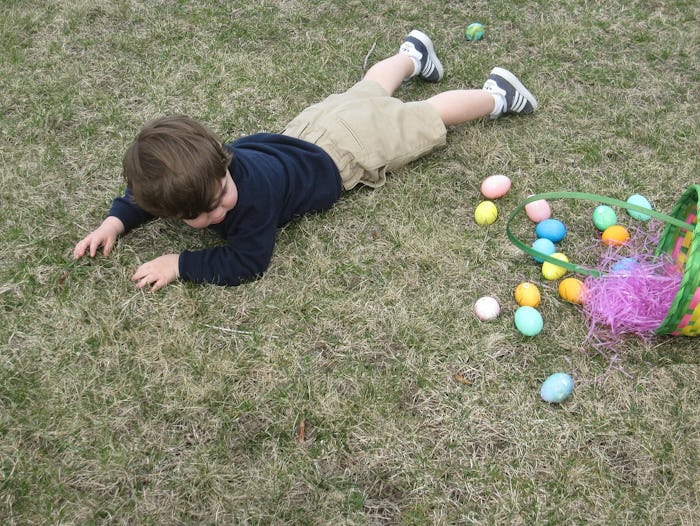It seems like just yesterday your little one wasn't even old enough to form a complete sentence, then you blinked, and now your kid is a question-asking machine. Sure, there are the classic ponderings about why the sky is blue, the grass is green, and where the sun go at night. But then there are the bigger questions, like "Where do babies come from?" and "Is the Easter Bunny real?" Even the most seasoned parenting vet might take a moment to figure out how to explain Easter to children. To say it's complicated is an understatement.
Whether you and your family are particularly religious or not, the holiday of Easter is celebrated by people of all walks of life throughout the world. For many, egg hunts, chocolate bunnies, and obligatory pictures with a giant costumed rabbit are all just a part of growing up. Though you might not be able to protect your child from discovering the truth about things like the Tooth Fairy, Santa, and the Easter Bunny, you can prepare your child by explaining Easter in a kid-friendly way. After all, the magic of childhood can live on by understanding the underlying "big picture" lessons of life, death, community, and kindness.
1Read A Book Together
Most children, no matter how young or old, enjoy reading with their family. One of the unexpected perks of using a book to answer certain questions is that it's a way to spark discussions, make information easily digestible, and take the pressure out of a one-on-one conversation. There are plenty of children's books available that tackle the topic of explaining Easter. From the faith-based (What Does Easter Mean Anyway? by Twin Sisters) to the non-religious (The Story Of The Easter Bunny by Katherine Tegen) and even simple stories for the youngest of kids to easily comprehend (Duck & Goose, Here Comes the Easter Bunny! by Tad Hills), there are plenty of options.
2Attend A Religious Service
I know many families who don't regularly attend church, but do celebrate the major Christian holidays, like Easter and Christmas. So no matter where you fall on the spectrum of religious devotion, you can use this opportunity to introduce your child to the traditions you and your family hold dear.
Often times, in the weeks leading up to Easter, churches will offer Sunday School classes that focus specifically on the meaning and significance of the celebration in Christianity for children of different ages. You can always check with your local congregation to see what kind of take-home material they offer, as well.
3Be Honest
This may not be for everyone, but my partner and I have chosen to let our child know that characters like the Easter Bunny, the Tooth Fairy, and Santa are make-believe. This doesn't mean that we are raising our son without the iconic stories or depriving him of traditional experiences. We still celebrate Christmas and Easter, but our focus is more on appreciating family, community, and the spirit of giving.
Depending on how old your child is, you may not have to even do too much explaining if you want to go this route. By simply portraying the characters as fictional from the get-go and emphasizing the moral of the story, you might not ever have to explicitly tell them that the Easter Bunny isn't real. Using the holiday as a backdrop, you can take this opportunity to talk about the gift of life, the emotions of loss, and the importance of doing good unto one another.
